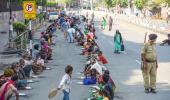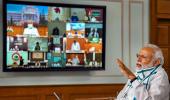Majority of respondents favoured continuation of the lockdown for another two weeks to fight coronavirus, according to a survey by think-tank National Council of Applied Economic Research.

The government on Friday extended the lockdown for another two weeks from May 4. It had imposed a 21-day nationwide lockdown on March 25 and extended it further till May 3 to contain the spread of deadly coronavirus.
The second round of Delhi National Capital Region Coronavirus Telephone Survey, conducted during April 23-26 by the NCAER, is based on responses from 1,800 adults.
In the survey, respondents were asked whether they would support continuing the lockdown for an additional two weeks.
In Round 2 (April 23- 26), about 88 per cent of respondents expressed some degree of support for continuing the lockdown for an additional two weeks, compared to 86 per cent in Round 1 (April 3-6).
"Quite remarkably, support for continuing the lockdown was about the same in Round 2," the NCEAR said in a release.
In Round 1, 62 per cent strongly supported the continuation of the lockdown and 24 per cent expressed some support, it added. Round 1 of the DCVTS-1 was conducted between April 3 and 6 and responses of 1,756 adults were obtained.
When asked what activities they would resume immediately if the lockdown were to be lifted after May 3, more than a third of respondents said they would in effect continue social distancing.
Some 37 per cent of respondents were of the opinion that they would not resume activities such as going to their work place, educational institutions, a bank, ATM or post office, a market, religious places, health facilities, visiting family and friends, or attending social functions, the survey showed.
On the impact of the lockdown on the livelihoods of people, the vast majority (82 per cent) of the DCVTS-2 respondents reported some level of reduction in their income or wages in the two weeks before the Survey with the reduction being the highest for casual wage workers and businesses, similar to the findings of DCVTS-1.
The NCAER said the DCVTS-2 analysed people's perception about the risk of their getting infected by the coronavirus.
"In Round 2, we found that 76.2 per cent of respondents did not perceive any chance of their or their household members getting infected," it said.











 © 2025
© 2025